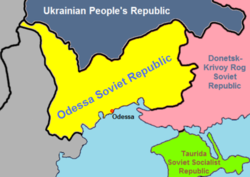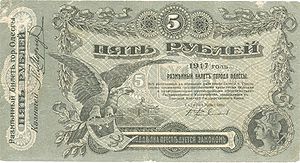- Odessa Soviet Republic
-
Odessa Soviet Republic
Одесская Советская Республика← 
←
1918  →
→
 →
→Flag
Areas claimed by the Odessa Soviet Republic on March 1, 1918. Capital City of Odessa Language(s) Russian Government Rumcherod Chairman Vladimir Yudovsky Legislature Council of the People's Commissars Historical era World War I - Establishment of Soviet power January 5, 1918 - Sack March 13, 1918 Currency Odessa ruble Odessa Soviet Republic (OSR) (Ukrainian: Одеська Радянська Республіка; Russian: Одесская Советская Республика) was a short-lived Soviet republic formed January 31 [O.S. January 18] 1918 out of parts the Kherson and Bessarabia Governorates of the former Russian Empire.
The republic was proclaimed right before the Bolshevik forces pushed the Ukrainian government out of Kiev and Sfatul Ţării proclaimed the independence of the Moldavian Democratic Republic. The Odessa's governing body was the Rumcherod formed in May 1917 shortly after the February Revolution. After its Second Congress the committee was chaired by Vladimir Yudovsky who was installed there after the Sovet coup d'état organized by the Narkom Nikolai Krylenko.
Yudovsky later was appointed as the chairman of the local Council of the People's Commissars in January 1918. His government was formed out of the Bolsheviks, Anarchists and Social Revolutionaries. The government proclaimed Odessa a free city, and pledged allegiance to the Bolshevik government in Petrograd. In February 1918 the government was liquidated by Mikhail Muravyov and merged with the regional Central Executive Committee Rumcherod which was downgraded to an oblast administration.
The city issued its own postage stamps and money, that under conditions of the Civil War and overall instability in the region, had greater value than any money issued by any central government of that part of the former Russia Empire.
Due to its short term of existence and the unstable political situation, the OSR was not recognized by any other government, including Russian Bolsheviks. The republic successfully stopped the advancing Romanian Armed Forces at Dniester, managing to conduct series of counter-attacks across the river against them in Bessarabia on which OSR laid a claim. The Odessa republic ceased to exist when it was sacked by German and Austro-Hungarian troops two months after its creation on March 13, 1918 as part of the Treaty of Brest-Litovsk between the Central Powers, Ukrainian People's Republic, and the Petrograd sovnarkom. Its government and army evacuated at first to Nikolayev and then to Sebastopol and Rostov-on-Don with the articles of war and archives.
See also
- Mishka Yaponchik - famous sponsor of the city and the fighter in the anti-bourgeoisie movement
- Hungarian–Romanian War of 1919
- Rumcherod, the governing body of OSR
- Iona Yakir
References
External links
- Odessa Soviet Republic on odesskiy.com (Russian)
- Odessa Soviet Republic on leksika.com.ua (Ukrainian)
Categories:- Short-lived states of World War I
- Former countries in Europe
- States and territories established in 1918
- States and territories disestablished in 1918
- 1918 disestablishments
- Odessa
- Early Soviet republics
- Former unrecognized countries
- Post–Russian Empire states
- History of Ukraine
- Ukrainian history stubs
Wikimedia Foundation. 2010.



